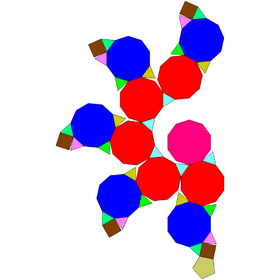Augmented truncated dodecahedron
| Augmented truncated dodecahedron | |
|---|---|
 | |
| Type | Johnson J67 - J68 - J69 |
| Faces | 5x5 triangles 5 squares 1 pentagon 1+2x5 decagons |
| Edges | 105 |
| Vertices | 65 |
| Vertex configuration | 4.5+3.10(3.102) 5(3.4.5.4) 10(3.4.3.10) |
| Symmetry group | C5v |
| Dual polyhedron | - |
| Properties | convex |
| Net | |
 | |
In geometry, the augmented truncated dodecahedron is one of the Johnson solids (J68). As its name suggests, it is created by attaching a pentagonal cupola (J5) onto one decagonal face of a truncated dodecahedron.
A Johnson solid is one of 92 strictly convex polyhedra that is composed of regular polygon faces but are not uniform polyhedra (that is, they are not Platonic solids, Archimedean solids, prisms, or antiprisms). They were named by Norman Johnson, who first listed these polyhedra in 1966.[1]
External links[]
- ^ Johnson, Norman W. (1966), "Convex polyhedra with regular faces", Canadian Journal of Mathematics, 18: 169–200, doi:10.4153/cjm-1966-021-8, MR 0185507, Zbl 0132.14603.
Categories:
- Johnson solids
- Polyhedron stubs